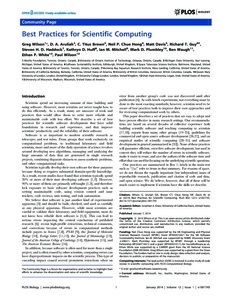| dc.contributor.author | Wilson, G. | |
| dc.contributor.author | Aruliah, D. A. | |
| dc.contributor.author | Brown, C.T. | |
| dc.contributor.author | Chue Hong, N.P. | |
| dc.contributor.author | Davis, M. | |
| dc.contributor.author | Guy, R.T. | |
| dc.contributor.author | Haddock, S.H.D. | |
| dc.contributor.author | Huff, K.D. | |
| dc.contributor.author | Mitchell, I.M. | |
| dc.contributor.author | Plumbley, M.D. | |
| dc.contributor.author | Waugh, B. | |
| dc.contributor.author | White, E.P. | |
| dc.contributor.author | Wilson, P. | |
| dc.date.accessioned | 2018-07-29T14:05:30Z | |
| dc.date.available | 2018-07-29T14:05:30Z | |
| dc.date.issued | 2014 | |
| dc.identifier.citation | Wilson, G.; Aruliah, D.A.; Brown, C.T.; Chue Hong, N.P.; Davis, M.; Guy, R.T. et al (2014) Best Practices for Scientific Computing. PLoS Biology, 12(1): e1001745. DOI: https://doi.org/10.1371/journal.pbio.1001745 | en_US |
| dc.identifier.uri | http://hdl.handle.net/11329/495 | |
| dc.identifier.uri | http://dx.doi.org/10.25607/OBP-77 | |
| dc.description.abstract | Scientists spend an increasing amount of time building and using software. However, most scientists are never taught how to do this efficiently. As a result, many are unaware of tools and practices that would allow them to write more reliable and maintainable code with less effort. We describe a set of best practices for scientific software development that have solid foundations in research and experience, and that improve scientists' productivity and the reliability of their software.
Software is as important to modern scientific research as telescopes and test tubes. From groups that work exclusively on computational problems, to traditional laboratory and field scientists, more and more of the daily operation of science revolves around developing new algorithms, managing and analyzing the large amounts of data that are generated in single research projects, combining disparate datasets to assess synthetic problems, and other computational tasks.
Scientists typically develop their own software for these purposes because doing so requires substantial domain-specific knowledge. As a result, recent studies have found that scientists typically spend 30% or more of their time developing software [1],[2]. However, 90% or more of them are primarily self-taught [1],[2], and therefore lack exposure to basic software development practices such as writing maintainable code, using version control and issue trackers, code reviews, unit testing, and task automation. | en_US |
| dc.language.iso | en | en_US |
| dc.rights | Attribution 4.0 | * |
| dc.rights.uri | http://creativecommons.org/licenses/by/4.0/ | * |
| dc.subject.other | Software development | en_US |
| dc.subject.other | Research validity | |
| dc.subject.other | Programming language | |
| dc.title | Best Practices for Scientific Computing. | en_US |
| dc.type | Journal Contribution | en_US |
| dc.description.refereed | Refereed | en_US |
| dc.format.pagerange | e1001745 | en_US |
| dc.identifier.doi | 10.1371/journal.pbio.1001745 | |
| dc.subject.parameterDiscipline | Parameter Discipline::Cross-discipline | en_US |
| dc.subject.dmProcesses | Data Management Practices::Data analysis | en_US |
| dc.bibliographicCitation.title | PLoS Biology | en_US |
| dc.bibliographicCitation.volume | 12 | en_US |
| dc.bibliographicCitation.issue | 1 | en_US |
| dc.description.bptype | Best Practice | en_US |
| dc.description.bptype | Manual | en_US |
| obps.contact.contactemail | gvwilson@software-carpentry.org | |
| obps.resourceurl.publisher | http://journals.plos.org/plosbiology/article?id=10.1371/journal.pbio.1001745 | en_US |
 Repository of community practices in Ocean Research, Applications and Data/Information Management
Repository of community practices in Ocean Research, Applications and Data/Information Management

